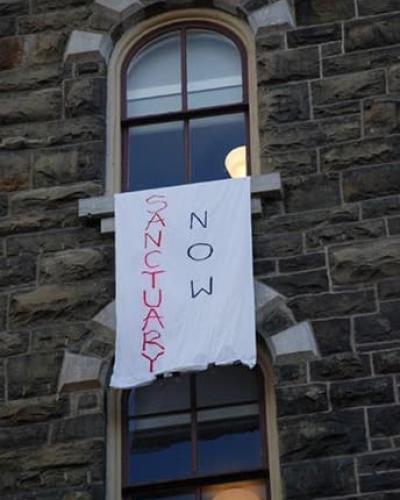The History Department is an intentionally diverse community of scholars whose presence and perspectives are critical to our work as historians and to our understanding of the past. We stand together as historians; we stand together as well, as members of a diverse community composed of different racial, ethnic, and national backgrounds, and of different religious beliefs and sexualities. We are fully committed to defending that diversity and we stand in solidarity with our colleagues, our students and our staff who may be feeling particularly vulnerable at this time.
The History Department endorses the statement of the AHA.
AHA Condemns Executive Order Restricting Entry to the United States
The American Historical Association most urgently condemns the Executive Order issued by President Donald J. Trump on January 27th purportedly “protecting the nation from foreign terrorist entry into the United States.” The Order immediately denies entry for the next three months to anyone holding passports from Iran, Iraq, Libya, Somalia, Sudan, Syria, and Yemen, indefinitely suspends entry of Syrian refugees, and halts all processing of refugees in locations outside the United States for four months. Historians look first to evidence, and in this case it is clear deaths from terrorism in the United States have come at the hands of native-born citizens and immigrants from countries other than those singled out for exclusion.
We also find little evidence that the authors of the Order have learned anything from the history of our nation’s experience with immigrants, refuges, and relevant public policy. Nor have they apparently thought through the impact that the order would have on thousands of innocent people, whether inhabitants of refugee camps across the world who have waited months or even years for interviews scheduled in the coming month (now canceled), travelers enroute to the United States with valid visas or other documentation, or residents of the United States with full documentation – and of course families and employers as well.
The AHA takes particular note of opportunities to learn from our nation’s history. Formulating or analyzing policy by historical analogy admittedly can be dangerous; context matters. But the past does provide warnings, especially given advantages of hindsight. What we have seen before can help us understand possible implications of what we are considering today. In this case what we have seen before should give Americans pause, as the most striking example of American refusal to admit refugees in a time of crisis abroad was during the late 1930s, when Jews and others fled Nazi Germany and sought admission to the United States. A combination of hostility toward a particular religious group combined with suspicions of disloyalty and potential subversion by supposed radicals anxious to undermine our democracy contributed to exclusionist administrative procedures that slammed shut the doors on millions of refugees. Many were subsequently systematically murdered as part of the German “final solution to the Jewish question.” Ironically, President Trump issued his Executive Order on Holocaust Remembrance Day.
Conversely, when refugees have found their way to our shores, the United States has benefited from their talents and energy that has characterized broader immigration patterns. The AHA points especially to how our own discipline has been enriched by individuals needing to flee their homelands. Gerda Lerner, a major force in the rise of women’s history had fled Austria in 1939. The distinguished historian of Germany Hajo Holborn arrived in 1934 from Germany. Civil War historian Gabor Borritt found refuge in the United States after participating in the 1956 uprising in Hungary. More recently, immigration scholar Maria Cristina Garcia, fled Fidel Castro’s Cuba with her parents in 1961. The list is long and could be replicated in nearly every discipline.
Supreme Court Justice Thurgood Marshall, like many of his colleagues before and since, did think historically in ways that should inform consideration of President Trump’s recent Executive Order. In a 1989 dissent (Skinner v. Railway Executives Association) Justice Marshall observed that “History teaches that grave threats to liberty often come in time of urgency, when constitutional rights seem too extravagant to endure. The World War II Relocation–camp cases and the Red Scare and McCarthy-era internal subversion cases are only the most extreme reminders that when we allow fundamental freedoms to be sacrificed in the name of real or perceived exigency, we invariably come to regret it.”





